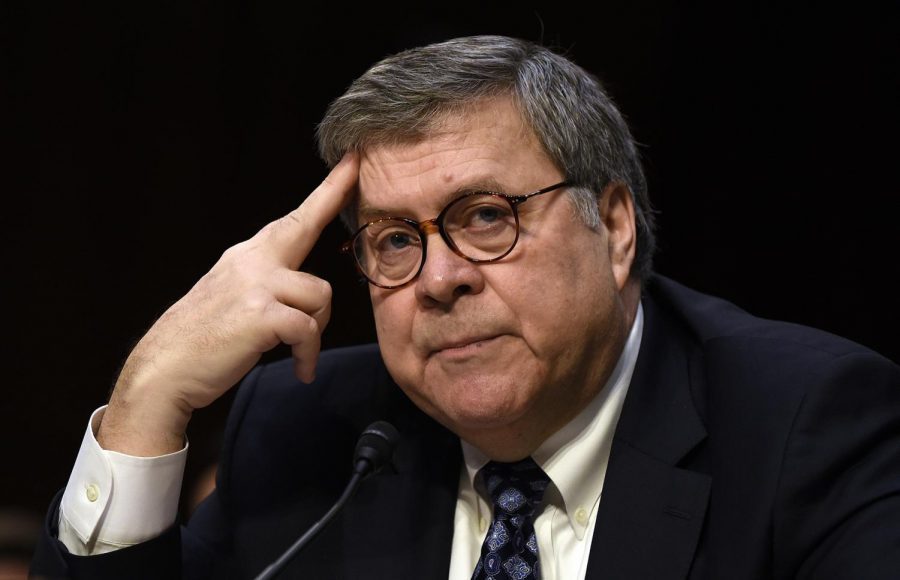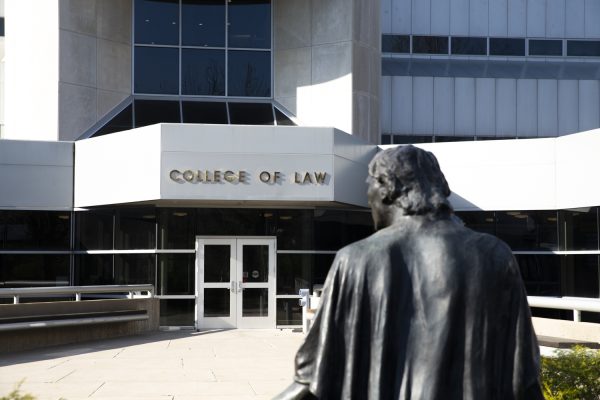Barr confirmed as Trump’s attorney general, winning power over Mueller probe
William Barr, nominee to be U.S. Attorney General, testifies during a Senate Judiciary Committee confirmation hearing on Capitol Hill on January 15, 2019, in Washington, D.C. (Olivier Douliery/Abaca Press/TNS)
February 14, 2019
By Chris Strohm
Bloomberg News
WASHINGTON — The Senate has confirmed William Barr as U.S. attorney general, putting him in charge of a department battered by partisan acrimony and confronting him with fundamental decisions on the future of Special Counsel Robert Mueller’s Russia investigation.
The confirmation vote of 54-45 on Thursday gave the 68-year-old attorney a second stint as the nation’s No. 1 law-enforcement officer — a job he previously held in the 1990s during the first Bush administration.
While that will make him a major figure on issues from immigration to antitrust policy, one of the corporate lawyer’s first decisions will be whether to recuse himself from overseeing Mueller’s politically explosive probe into Russian interference in the 2016 election and whether Donald Trump or any of his associates conspired in the operation.
Barr refused in his confirmation hearing last month to commit to recusing himself, saying he’d seek the advice of career ethics officials. Democrats expressed concern about Barr’s acknowledgment that he’s had “general conversations” with Vice President Mike Pence regarding the investigation. They also cited a memo Barr sent to the Justice Department last year criticizing Mueller for looking into President Donald Trump’s firing of former FBI Director James Comey as possible obstruction of justice.
Trump heaped frequent ridicule on former Attorney General Jeff Sessions for recusing himself from the Russia investigation, which Trump and House Republicans regularly call a “witch hunt.” Acting Attorney General Matthew Whitaker, whom Trump appointed after ousting Sessions in November, rejected the informal recommendation of a Justice Department ethics officer that he recuse himself for his past criticism of Mueller’s investigation.
Whitaker and Deputy Attorney General Rod Rosenstein, who appointed Mueller and has supervised his operations, are expected to leave the Justice Department soon. The confirmation vote fell mostly along party lines, although Republican Rand Paul of Kentucky voted against Barr and Democrats Doug Jones of Alabama, Joe Manchin of West Virginia, and Kyrsten Sinema of Arizona voted for him. While some Democrats have criticized Barr’s expansive view of presidential power, developed over a career that included serving as President George H.W. Bush’s attorney general from 1991 to 1993, Republican supporters emphasized his extensive experience.
“If America ever needed a steady hand at the Department of Justice it is now,” Republican Sen. Lindsey Graham, chairman of the Judiciary Committee, said on Feb. 12. “We’re looking for a new person to bring stability and improve morale” and “to be a steady hand at a time that our country is very much divided.”
Sen. Dianne Feinstein, the Judiciary Committee’s top Democrat, said in a statement after the confirmation vote that “while I opposed Bill Barr’s nomination, it’s my hope that he’ll remember that he is the people’s lawyer, not the president’s lawyer.”
If Barr takes charge of Mueller’s investigation, he will have to decide what to do with his final report, which will explain his decisions to prosecute or decline filing charges. During the confirmation hearing, Barr — who described Mueller as a longtime close friend — refused to commit to sharing the special counsel’s findings with Congress and the public.
He said regulations call for Mueller’s report to be confidential and “the report that goes public would be a report by the attorney general.” He also suggested he might exclude criticism of Trump from any such public report in light of the Justice Department’s policy that a president can’t be indicted while in office.
“If you’re not going to indict someone, then you don’t stand up there and unload negative information about the person,” he said.
Graham said Justice Department regulations authorizing special counsels will require notification to the Senate and House Judiciary panels at the end of the probe if Mueller is prevented from pursuing any specific action.
Graham said he also expects Barr to examine whether Justice Department or FBI officials abused surveillance and intelligence powers while investigating Trump and his campaign, a theme pursued by Republicans who contend that anti-Trump bias tainted the Russia investigation in its early phases.
Other issues that might require early attention from Barr include whether the department issues a legal opinion about declaring a national emergency along the southern border — which Trump has indicated he may invoke to shift funds for his border wall — and whether to play a role in reviewing a proposed merger between T-Mobile US Inc. and Sprint Corp. Barr is a former general counsel for one of their rivals, Verizon Communications Inc., and he has a history of assailing government regulation and corporate enforcement.
(c)2019 Bloomberg News
Visit Bloomberg News at www.bloomberg.com
Distributed by Tribune Content Agency, LLC.














